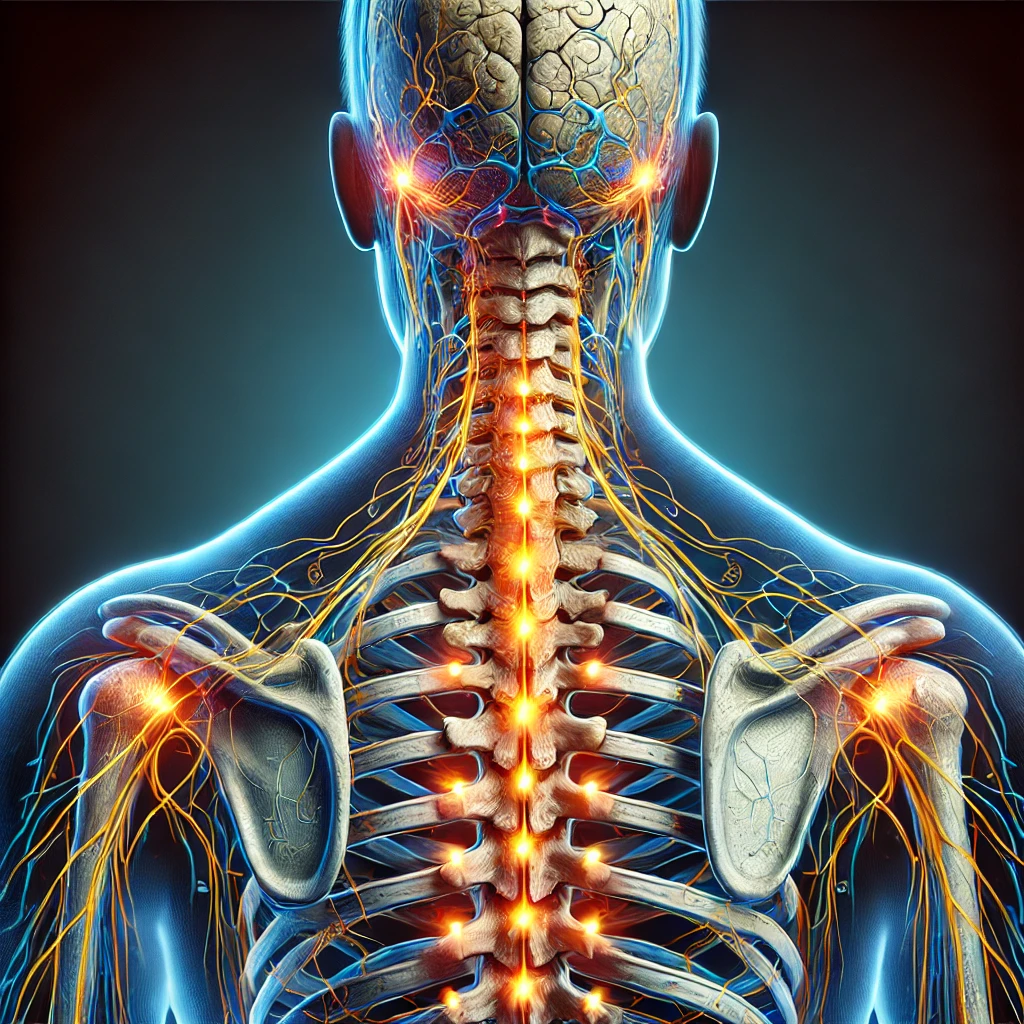Degenerative cervical myelopathy
Degenerative cervical myelopathy (DCM) is a progressive, age-related condition characterized by the narrowing of the spinal canal and compression of the spinal cord in the neck (cervical) region. It results from changes to the bones, ligaments, and discs of the spine that commonly occur as people age. This compression can lead to a range of symptoms affecting the nerves and their functions, which can significantly impact daily life and mobility if not addressed.
What is Degenerative Cervical Myelopathy?
DCM develops when degenerative changes in the cervical spine put pressure on the spinal cord. The spinal cord acts as a conduit for nerve signals traveling between the brain and the rest of the body. Compression of the spinal cord can disrupt these signals and lead to neurological symptoms. The condition is most commonly associated with:
- Degenerative disc disease: The intervertebral discs, which cushion the vertebrae, may lose water content, become brittle, or bulge, leading to spinal canal narrowing.
- Osteophytes (bone spurs): Extra bony growths that can develop as part of arthritis may narrow the space for the spinal cord.
- Ligament thickening (ligamentum flavum hypertrophy): Ligaments that stabilize the spine can become thicker and press against the spinal cord.
- Facet joint degeneration: Wear and tear on the joints connecting vertebrae can cause changes that encroach on the spinal cord.
Symptoms of Degenerative Cervical Myelopathy
DCM symptoms can range in severity and may develop gradually or suddenly. Common symptoms include:
- Neck pain or stiffness: Discomfort and limited range of motion in the neck area.
- Tingling or numbness: Often starts in the fingers or toes but can also affect the arms, legs, or body.
- Loss of manual coordination: Difficulty with fine motor tasks such as fastening buttons or using utensils.
- Pain, weakness, or heaviness: Affects the arms, hands, legs, or feet.
- Imbalance and falls: Feeling unsteady on your feet, which increases the risk of falls.
- Walking difficulties: Legs may feel heavy, stiff, or weak.
- Bladder or bowel issues: Increased urgency or, in severe cases, incontinence.
When to Seek Professional Help
While neck pain and numbness are common complaints and may not always signify a medical emergency, DCM requires careful attention, especially if symptoms worsen. You should contact a healthcare professional if you notice a gradual worsening of symptoms over time. Immediate medical help may be necessary if you experience:
- Sudden changes in sensation in the arms, hands, legs, or feet.
- Loss of dexterity or strength in the hands or feet.
- Problems with balance, walking, or frequent falls.
- Difficulty with bladder or bowel function, including urgency, leaking, or incontinence.
Diagnosing Degenerative Cervical Myelopathy
Diagnosis involves a thorough evaluation by a healthcare professional, including:
- Symptom history: The healthcare provider will ask about your symptoms, their duration, and impact on daily life.
- Physical examination: This may include tests for strength, reflexes, coordination, sensation, and gait.
- Imaging studies: An MRI scan is often used to visualize the spinal cord, assess the severity of compression, and rule out other causes.
In some cases, additional testing, such as X-rays or CT scans, may be recommended.
Causes of Degenerative Cervical Myelopathy
The primary causes are age-related changes in the cervical spine, including:
- Narrowing of the spinal canal due to aging-related degeneration.
- Structural changes to the bones, ligaments, and discs in the neck, leading to spinal cord compression.
The aging process can lead to bone overgrowth, disc degeneration, and ligament thickening, all of which can reduce the available space for the spinal cord.
Treatment Options for Degenerative Cervical Myelopathy
Treatment is tailored based on symptom severity and imaging findings. The options include:
Self-management and lifestyle modifications:
- Postural changes: Maintaining a good posture can reduce stress on the neck.
- Activity modification: Avoiding activities that exacerbate symptoms.
- Physiotherapy: Exercises to improve mobility, strength, and posture.
Medications:
- Pain relievers: Nonsteroidal anti-inflammatory drugs (NSAIDs) or other pain management options may be recommended.
- Muscle relaxants: May help with muscle stiffness.
Surgical intervention:
- Decompression surgery: To relieve pressure on the spinal cord by removing or reshaping structures causing the compression.
- Spinal fusion: This may be performed to stabilize the affected area of the spine.
The decision to undergo surgery depends on the severity of symptoms, overall health, and potential risks.
Impact on Work and Daily Life
DCM may require adjustments to work and daily routines. Recovery periods, time off work, and ergonomic adaptations may be necessary. An open discussion with employers and occupational health professionals can help ensure appropriate accommodations are made.
Emotional and Mental Wellbeing
Living with DCM can be challenging, both physically and mentally. It is important to seek emotional support, whether through counseling, support groups, or mental health services, to help manage stress and maintain a positive outlook during treatment and recovery.
This comprehensive approach to managing DCM, including medical intervention, self-care strategies, and psychological support, aims to preserve quality of life and minimize symptoms’ impact on daily functioning.







